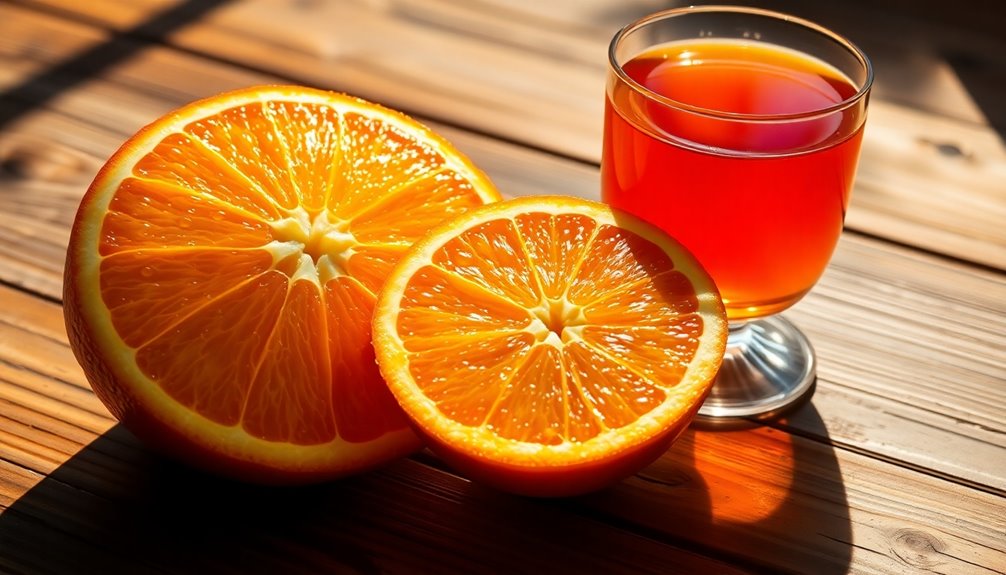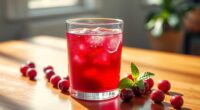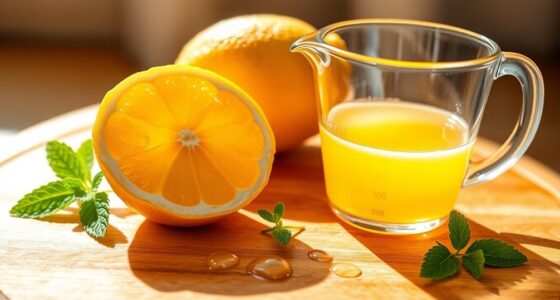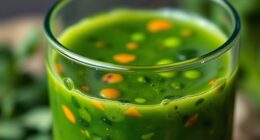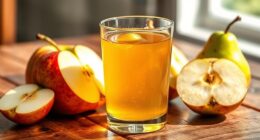A medium-sized orange gives you about 4 to 5 tablespoons of juice, which is roughly 1/4 to 1/3 cup. So, if you're aiming for a full cup, you'll need around three oranges. The juiciness can vary based on the type of orange you choose, with Valencia oranges being the juiciest. If you're curious about which varieties might work best for your juicing needs, there's plenty more to discover.
Key Takeaways
- A medium-sized orange typically yields about 4 to 5 tablespoons of juice.
- This amount is roughly equivalent to 1/4 to 1/3 cup of juice.
- Generally, it takes about three medium oranges to produce one full cup of juice.
- Juice yield may vary depending on the orange variety and ripeness, with Valencia oranges offering higher juice content.
- Thinner-skinned oranges usually provide more juice than thicker-skinned varieties.
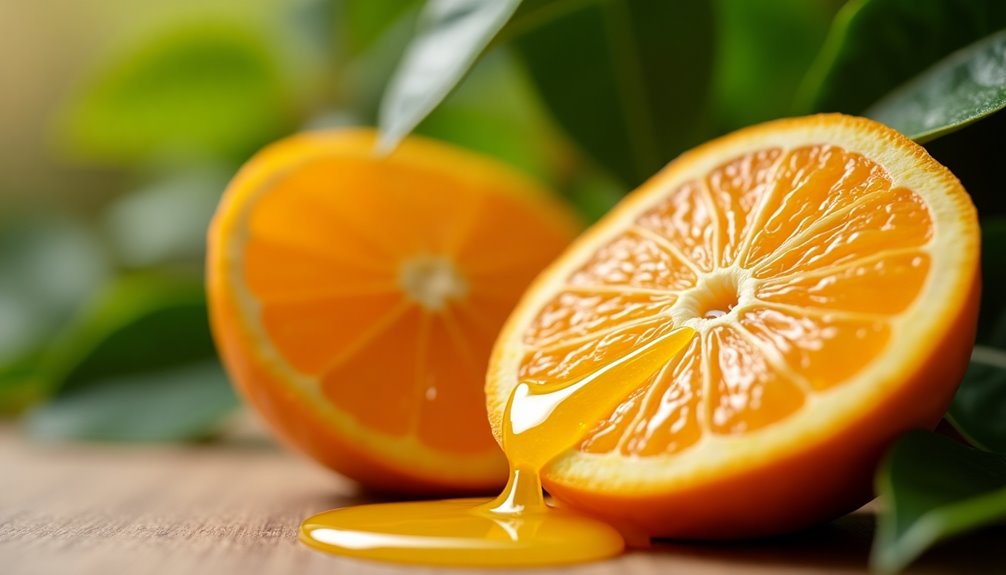
When you squeeze one medium-sized orange, you can expect to get about 4 to 5 tablespoons of juice, which is roughly 1/4 to 1/3 cup. This amount can vary slightly depending on the specific orange you choose. If you're looking to make a full cup of fresh juice, you'll need about three medium oranges. It's a straightforward calculation, but the juicy experience can be quite delightful, especially when you consider the different varieties of oranges available.
Valencia oranges are often the go-to choice for juicing. Known for their sweetness and high juice content, they can yield more liquid than other kinds. Their ripe flesh is packed with juice, making them a favorite among those who enjoy a refreshing drink. When you pick a ripe Valencia orange, you're not just getting flavor; you're also getting a higher juice yield.
If you ever find yourself in the grocery store, look for oranges that feel heavy for their size and have a vibrant color—that's usually a sign they're ripe and ready to extract some delicious juice from.
The juicing process is pretty simple. Just cut the orange in half and use a juicer or your hands to extract the juice. You might notice that oranges with a thin skin tend to yield more juice, while those with thicker skins may not be as generous. Environmental factors, like how much sunlight and water the orange tree received, also play a crucial role in determining how much juice you can extract. Oranges grown in optimal conditions tend to be plumper and juicier.
One of the perks of freshly squeezed orange juice is the nutritional benefits it brings. Each cup is packed with vitamin C, which is essential for a healthy immune system, and potassium, which helps regulate blood pressure. When you drink freshly squeezed juice, you're getting all the goodness without any added sugars or preservatives. That's a significant advantage over store-bought options, where juice can often be diluted or altered. Additionally, freshly squeezed orange juice can be enjoyed as part of a healthy breakfast fruit juice combination, providing a nutritious start to your day.
If you're considering making juice at home, you'll want to experiment with different orange varieties. While Valencia oranges may be your best bet for sweetness, don't overlook other options like navel oranges. They can also provide a refreshing taste, though their juice content might be slightly less.
Whatever you choose, squeezing those medium-sized oranges will let you enjoy the satisfying process of extracting fresh juice.
Frequently Asked Questions
How Much Juice Do You Get From 2 Oranges?
When you juice two oranges, you’re likely to get about 8 to 10 tablespoons, which is roughly 1/2 to 5/8 cup. The exact amount of juice can vary depending on the size and ripeness of the oranges. On average, the juice yield from one orange is typically around 4 to 5 tablespoons, making it a great fruit for adding fresh flavor to beverages and dishes alike. Additionally, using a citrus juicer can help maximize extraction, ensuring you get every last drop of that refreshing juice.
If you're using Valencia oranges, expect around 8 to 10 ounces. Navel oranges might yield a bit less, around 6 to 8 tablespoons.
How Much Is the Juice of Half an Orange?
When you juice half an orange, you can expect to get about 2 to 2.5 tablespoons of juice. This amount can vary based on the orange's size, ripeness, and juiciness.
If you want to maximize the juice, try rolling the orange on the countertop before cutting it; this helps break down the cell walls and releases more liquid.
How Much Juice Does One Navel Orange Yield?
One navel orange typically yields about 4 to 5 tablespoons of juice, or roughly 2 to 3 ounces.
If you're looking to make fresh juice, you'll find navel oranges are great because they're sweet and juicy. Their yield can vary a bit depending on size and ripeness, but you can generally count on getting a good amount of juice from just one.
Enjoy that refreshing flavor!
How Many Oranges Make 8 Oz of Juice?
Imagine you're squeezing oranges like a barista crafting the perfect smoothie.
To fill an 8-ounce glass with fresh orange juice, you'll typically need about three medium-sized oranges. Each orange packs around 2 to 5 tablespoons of juice, so your yield can vary.
Depending on the variety and juiciness, you might need to adjust the count slightly. Remember, ripeness and size play a big role in how much juice you'll actually get!
Conclusion
In conclusion, you'll find that one medium orange typically yields about a quarter to a third of a cup of juice. That's enough to kickstart your day like an ancient Roman sipping on fresh citrus while plotting conquests! So, next time you grab an orange, remember the burst of flavor and nutrition packed inside. Whether you're making a refreshing drink or adding zest to your recipes, that little fruit packs a punch you won't want to miss!
Cindy thoroughly researches juicing trends, techniques, and recipes to provide readers with practical advice and inspiration. Her writing style is accessible, engaging, and designed to make complex concepts easy to understand. Cindy’s dedication to promoting the advantages of juicing shines through her work, empowering readers to make positive changes in their lives through the simple act of juicing.

